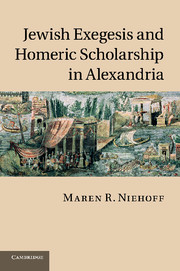In contrast to the Letter of Aristeas, which opposes, as we saw, the application of rigorous academic methods to the Bible, Demetrius' fragments provide early evidence of positive connections between biblical and Homeric scholarship. Some Alexandrian Jews read their Scripture as a piece of literature and applied literary techniques to its interpretation. Following Jacob Freudenthal's seminal work, scholars have generally recognized the importance of Demetrius in this context. While Freudenthal's dating of Demetrius to the third century bce can no longer be maintained, his overall interpretation of Demetrius in light of zetetic literature is certainly valid and deserves further study.
Thus far, the argument has remained surprisingly general, relying for the Homeric evidence on Alfred Gudemann's famous dictionary article. A comprehensive study of Demetrius' fragments in view of their immediate Alexandrian environment is still warranted. The first step in this direction must be a clear distinction between Demetrius himself and the already existing questions and answers mentioned by him. In this chapter I shall focus on Demetrius' references to the latter, using them as a basis for reconstructing the views of other, anonymous exegetes in Alexandria.
If these snippets of information are analysed in light of their cultural environment, it emerges that Demetrius' colleagues were firmly committed to the Aristotelian style of question and answer. Moreover, these fragments throw new light on the development of the genre in Alexandria, where Aristarchus was sensitive to the same kinds of question, providing strikingly similar answers.
